M. Hulot's Holiday, 1953, directed by Jacques Tati, written by Henri Marquet, Jacques Tati, Pierre Aubert, and Jacques Lagrange.
It's easy to forget just how much comedy is fueled by misanthropy until you encounter a film like M. Hulot's Holiday. As something of a misanthrope myself, I have mixed feelings about this kind of movie. On the one hand, it's a gentle, affectionate film that manages to evoke the laziness of summer vacations without being lazy itself. On the other hand, this is a comedy in which no one gets kicked in the nuts. How on earth did they cut a trailer?
M. Hulot's Holiday may have been released in 1953, but its sensibility and technique are both from silent films. Although it is nominally in French, there are very few subtitles, and none of them are strictly necessary. It doesn't take more than an instant to recognize Hulot as a silent film character, as iconic as Chaplin's Tramp, instantly recognizable by silhouette.
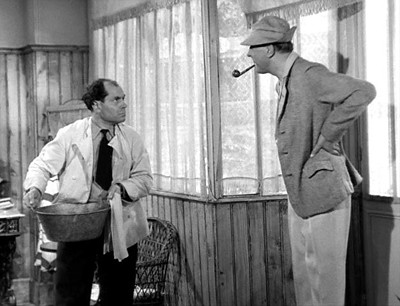
Although he has the same talent for pissing off waiters, hotel managers, and functionaries of all stripes, Hulot generally causes less chaos than the Tramp. The pacing is very different from a Chaplin film, or indeed, most comedies, silent or no. There are a few sequences of rapidly escalating catastrophe, most memorably when Hulot manages to set an entire shed of fireworks on fire.
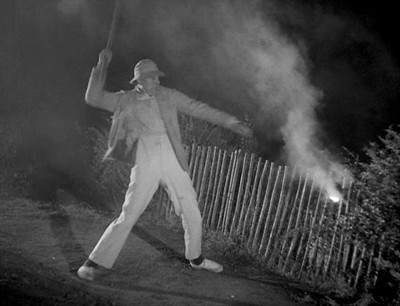
This is the kind of comedy we're used to: the clown racing around as things blow up around him. And there are other instances of brilliant physical comedy, even if they don't have that "Hall of the Mountain King" sense of impending disaster. Hulot's tennis match is a particular standout.
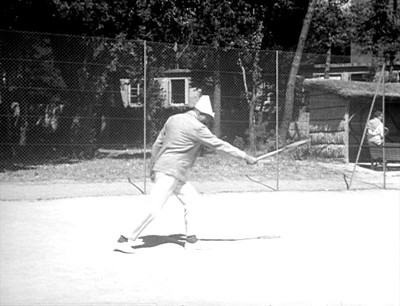
But I honestly laughed hardest at a moment that no one but Tati could have pulled off: a shot of Hulot near-hypnotized by a gob of taffy nearly falling from its hook.
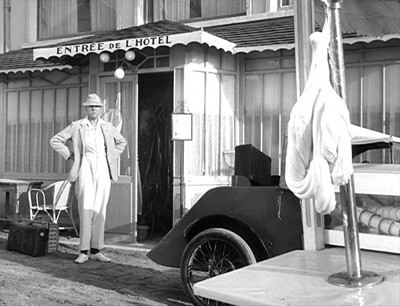
The taffy slowly droops, getting closer and closer to the counter, until at the last minute, just as Hulot is about to spring into action, the hand of the proprietor sweeps in from out of frame and catches it. Tati stays on this for a good thirty seconds (and returns to it later in the film), and I can't think of anything else quite like it. The rhythm of the joke, it seems to me, is not far from the peek-a-boo game we all found so mind-blowingly hilarious as babies, and maybe that's what Tati's tapping into here. Or maybe I'm just the kind of person who would feel the same irresistable urge to grab the taffy before it hits the cart. In any event, it cracked me right up.
Still, it must be said that visual language of the film is surprisingly conventional, at least compared to the loopy modernist brilliance of Play Time. I saw M. Hulot's Holiday for the first time about a year after Play Time and it's amazing how dramatically his visual style evolved. There are a few visual puns of the sort that Tati perfected in his later films, like this shot of a man transformed into a horse:
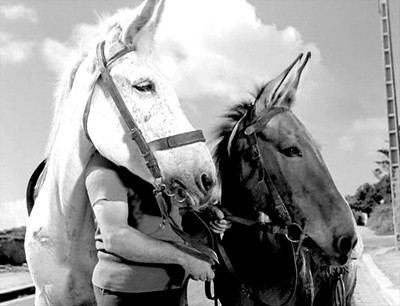
There's one brilliantly executed longer joke of this sort. Hulot's car breaks down at a funeral, and he drops the spare tire into a puddle of muddy leaves just as a chauffeur gathers funeral wreaths for the ceremony, and you can probably see where this is going:
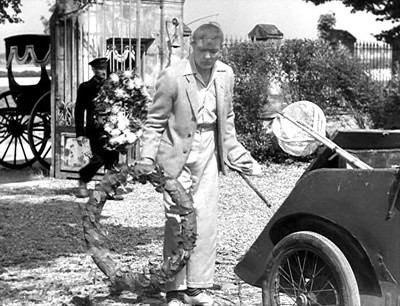
The interesting thing about the confusion with the spare tire is that it only works in black and white; you could probably get an undergraduate paper out of that fact if you throw the name Borges around enough.
I try to be cautious of my tendency to overpraise work that yields to, shall we say, vigorous critical exegesis; at various points in my life I've been a Pink Floyd fan and an English teacher.1 So it's possible that my preference for Play Time over M. Hulot's Holiday stems from my own character flaws—or my sense that modernity is attacking me, too. I will admit to being charmed beyond all measure by the one point where everything comes together, a costume ball where Hulot, against all odds, has a moment of grace and dignity.
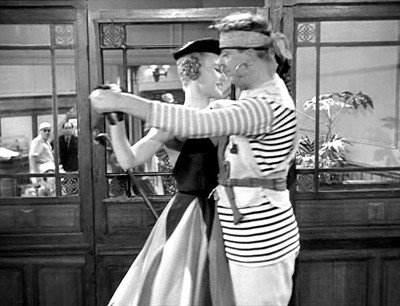
Of course, shortly thereafter, Tati has him catapulted at great speed into a canal.
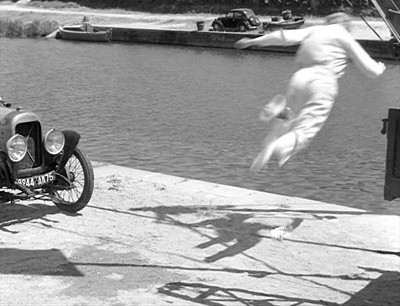
Comedy, like science, requires victims. But the unique thing about M. Hulot's Holiday is that it isn't about Hulot's ritual humiliations. Tati is at least as interested in the sound of the ocean, the strange collections of people who are thrown together on vacation, and that moment—you must have been around six—when your parents' car finally turned off the highway and the ocean came into view.
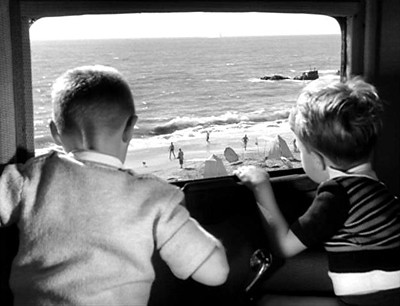
Randoms
- If you'd like to see Tati in more of the ritual-humilitation-type comedy, the DVD includes René Clément's short Soigne ton Gauche, in which a pre-Hulot Tati plays a wannabe boxer. It goes about as well as you'd expect.
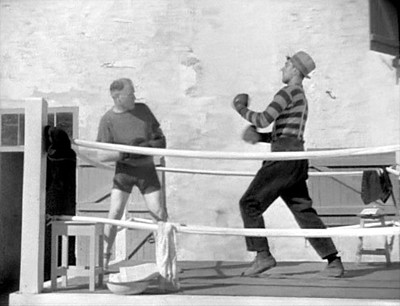
1Fortunately, neither took.

